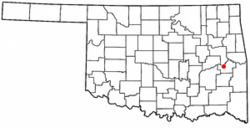Whitefield, Oklahoma
| Whitefield, Oklahoma | |
|---|---|
| Town | |
 Location of Whitefield, Oklahoma |
|
| Coordinates: 35°15′12″N 95°14′16″W / 35.25333°N 95.23778°WCoordinates: 35°15′12″N 95°14′16″W / 35.25333°N 95.23778°W | |
| Country | United States |
| State | Oklahoma |
| County | Haskell |
| Area | |
| • Total | 2.6 sq mi (6.8 km2) |
| • Land | 2.4 sq mi (6.3 km2) |
| • Water | 0.2 sq mi (0.4 km2) |
| Elevation | 561 ft (171 m) |
| Population (2000) | |
| • Total | 231 |
| • Density | 94.4/sq mi (36.4/km2) |
| Time zone | Central (CST) (UTC-6) |
| • Summer (DST) | CDT (UTC-5) |
| ZIP code | 74472 |
| Area code(s) | 539/918 |
| FIPS code | 40-80800 |
| GNIS feature ID | 1099723 |
Whitefield is a town in northwestern Haskell County, Oklahoma, United States. The population was 391 at the 2010 census, compared with 231 at the 2000 census. It was named for a Methodist bishop, George Whitefield (1714 - 1770).
Whitefield's history can be traced to the American Civil War], when the Confederate Army established Camp Pike for two thousand Confederate soldiers in 1861. The site was then in Indian Territory and within the boundaries of the Choctaw Nation. The camp was named for Confederate Brigadier General Albert Pike, who had persuaded the Five Civilized Tribes to ally with the Confederate States of America.
After the end of the Civil War, Camp Pike became a Choctaw trading post. The trading post and the adjacent community were renamed as Oklahoma, Indian Territory. Its clientele were not only members of the Choctaw tribe, but also white settlers who had permits from the tribe to farm land in the Choctaw Nation. Occasionally, it was patronized by white outlaws such as Belle Starr, who were hiding from the law in the mountains of southern Oklahoma.The Post Office wanted to change the name because of confusion with another post office already known as Oklahoma Station. In 1888, the local residents voted to accept Whitfield as the name of the settlement and post office.
Whitefield existed primarily as a town to support the nearby farms. By 1911, it counted approximately 500 residents. Improvements included two groceries, two general stores, a cotton gin and mill, a drugstore, a doctor, and a blacksmith. It had about 300 residents by 1920. Reportedly, the population declined sharply with the onset of the Great Depression.Whitfield incorporated in 1978, so its first Federal Census in 1980 recorded 240 people. The population has trended upward since that year.
Whitefield is located at 35°15′12″N 95°14′16″W / 35.25333°N 95.23778°W (35.253403, -95.237879). According to the United States Census Bureau, the town has a total area of 2.6 square miles (6.7 km2), of which, 2.5 square miles (6.5 km2) of it is land and 0.2 square miles (0.52 km2) of it (6.51%) is water.
...
Wikipedia
